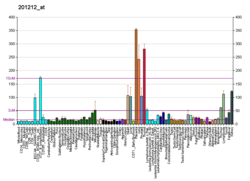LGMN
Legumain is a protein that in humans is encoded by the LGMN gene.[5][6][7]
This gene encodes a cysteine protease, legumain, that has a strict specificity for hydrolysis of asparaginyl bonds. This enzyme may be involved in the processing of bacterial peptides and endogenous proteins for MHC class II presentation in the lysosomal/endosomal systems. Enzyme activation is triggered by acidic pH and appears to be autocatalytic. Protein expression occurs after monocytes differentiate into dendritic cells. A fully mature, active enzyme is produced following lipopolysaccharide expression in mature dendritic cells. Overexpression of this gene may be associated with the majority of solid tumor types. This gene has a pseudogene on chromosome 13. Several alternatively spliced transcript variants have been described, but the biological validity of only two has been determined. These two variants encode the same isoform.[7]
References
- ^ a b c GRCh38: Ensembl release 89: ENSG00000100600 – Ensembl, May 2017
- ^ a b c GRCm38: Ensembl release 89: ENSMUSG00000021190 – Ensembl, May 2017
- ^ "Human PubMed Reference:". National Center for Biotechnology Information, U.S. National Library of Medicine.
- ^ "Mouse PubMed Reference:". National Center for Biotechnology Information, U.S. National Library of Medicine.
- ^ Tanaka T, Inazawa J, Nakamura Y (Dec 1996). "Molecular cloning of a human cDNA encoding putative cysteine protease (PRSC1) and its chromosome assignment to 14q32.1". Cytogenet Cell Genet. 74 (1–2): 120–3. doi:10.1159/000134397. PMID 8893817.
- ^ Chen JM, Dando PM, Rawlings ND, Brown MA, Young NE, Stevens RA, Hewitt E, Watts C, Barrett AJ (Apr 1997). "Cloning, isolation, and characterization of mammalian legumain, an asparaginyl endopeptidase". J Biol Chem. 272 (12): 8090–8. doi:10.1074/jbc.272.12.8090. PMID 9065484.
- ^ a b "Entrez Gene: LGMN legumain".
Further reading
- Maruyama K, Sugano S (1994). "Oligo-capping: a simple method to replace the cap structure of eukaryotic mRNAs with oligoribonucleotides". Gene. 138 (1–2): 171–4. doi:10.1016/0378-1119(94)90802-8. PMID 8125298.
- Suzuki Y, Yoshitomo-Nakagawa K, Maruyama K, et al. (1997). "Construction and characterization of a full length-enriched and a 5'-end-enriched cDNA library". Gene. 200 (1–2): 149–56. doi:10.1016/S0378-1119(97)00411-3. PMID 9373149.
- Chen JM, Dando PM, Stevens RA, et al. (1998). "Cloning and expression of mouse legumain, a lysosomal endopeptidase". Biochem. J. 335 (Pt 1): 111–7. doi:10.1042/bj3350111. PMC 1219758. PMID 9742219.
- Halfon S, Patel S, Vega F, et al. (1998). "Autocatalytic activation of human legumain at aspartic acid residues". FEBS Lett. 438 (1–2): 114–8. doi:10.1016/S0014-5793(98)01281-2. PMID 9821970. S2CID 32702742.
- Manoury B, Hewitt EW, Morrice N, et al. (1999). "An asparaginyl endopeptidase processes a microbial antigen for class II MHC presentation". Nature. 396 (6712): 695–9. doi:10.1038/25379. PMID 9872320. S2CID 4352065.
- Chen JM, Rawlings ND, Stevens RA, Barrett AJ (1999). "Identification of the active site of legumain links it to caspases, clostripain and gingipains in a new clan of cysteine endopeptidases". FEBS Lett. 441 (3): 361–5. doi:10.1016/S0014-5793(98)01574-9. PMID 9891971. S2CID 46043484.
- Chen JM, Fortunato M, Barrett AJ (2001). "Activation of human prolegumain by cleavage at a C-terminal asparagine residue". Biochem. J. 352 (2): 327–34. doi:10.1042/bj3520327. PMC 1221463. PMID 11085925.
- Strausberg RL, Feingold EA, Grouse LH, et al. (2003). "Generation and initial analysis of more than 15,000 full-length human and mouse cDNA sequences". Proc. Natl. Acad. Sci. U.S.A. 99 (26): 16899–903. Bibcode:2002PNAS...9916899M. doi:10.1073/pnas.242603899. PMC 139241. PMID 12477932.
- Li DN, Matthews SP, Antoniou AN, et al. (2003). "Multistep autoactivation of asparaginyl endopeptidase in vitro and in vivo". J. Biol. Chem. 278 (40): 38980–90. doi:10.1074/jbc.M305930200. PMID 12860980.
- Burster T, Beck A, Tolosa E, et al. (2004). "Cathepsin G, and not the asparagine-specific endoprotease, controls the processing of myelin basic protein in lysosomes from human B lymphocytes". J. Immunol. 172 (9): 5495–503. doi:10.4049/jimmunol.172.9.5495. PMID 15100291.
- Gerhard DS, Wagner L, Feingold EA, et al. (2004). "The Status, Quality, and Expansion of the NIH Full-Length cDNA Project: The Mammalian Gene Collection (MGC)". Genome Res. 14 (10B): 2121–7. doi:10.1101/gr.2596504. PMC 528928. PMID 15489334.
- Murthy RV, Arbman G, Gao J, et al. (2005). "Legumain expression in relation to clinicopathologic and biological variables in colorectal cancer". Clin. Cancer Res. 11 (6): 2293–9. doi:10.1158/1078-0432.CCR-04-1642. PMID 15788679.
- Oh JH, Yang JO, Hahn Y, et al. (2006). "Transcriptome analysis of human gastric cancer". Mamm. Genome. 16 (12): 942–54. doi:10.1007/s00335-005-0075-2. PMID 16341674. S2CID 69278.




